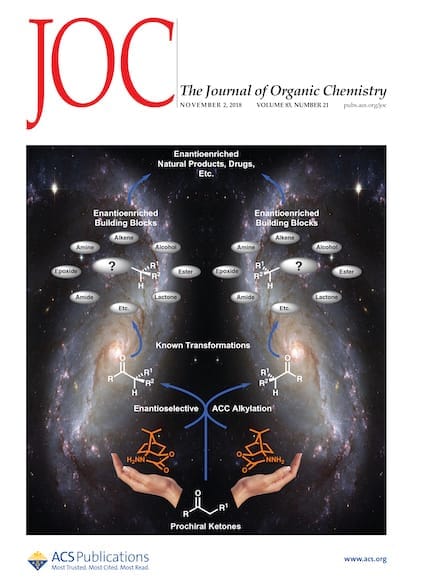Cosponsored by the ACS Division of Organic Chemistry and The Journal of Organic Chemistry, this annual award recognizes authors of an outstanding article published in the journal in the previous calendar year. The article is selected based on its creativity and impact in the field. The research groups of Xin Hong of Zhejiang University and […]

Cosponsored by the ACS Division of Organic Chemistry and The Journal of Organic Chemistry, this annual award recognizes authors of an outstanding article published in the journal in the previous calendar year. The article is selected based on its creativity and impact in the field.
The research groups of Xin Hong of Zhejiang University and Elizabeth Jarvo of the University of California, Irvine, are recognized for their article, Engaging Sulfonamides: Intramolecular Cross-Electrophile Coupling Reaction of Sulfonamides with Alkyl Chlorides. The article features research demonstrating neutral and unstrained amine derivatives as cross-electrophile coupling partners in nickel-catalyzed bond formation, providing a framework that will be beneficial to guide the development of new catalysts for the activation of other strong C−N bonds.
Liz Jarvo Kirsten Hewitt Erika Lucas Anthony Castro
Xin Hong Pan-Pan Chen
Learn more about the group by reading the highlights from our interview.
What does it mean to your group to be the recipient of this award?
- Jarvo: It is a great honor to be recognized with this award. There is so much beautiful chemistry every year in JOC, and so to have our paper selected as a representative is delightful. It is particularly nice that this project is part of a very fruitful collaboration between my lab and the Hong lab.
- Hong: Being a recipient of this award is such a great honor. It is thrilling that our work is recognized by JOC, one of the most prestigious platforms of organic chemistry. This work represents the wonderful collaborations between the Jarvo group and us, which is full of joy and excitement.
What prompted you to study this field of chemistry?
- Jarvo: I first became intrigued by nickel catalysts when my group was developing palladium catalysts for electrophile allylation. Trying to coax a palladium complex to give “unusual” reactivity is a challenge, but with nickel complexes, there are many more mechanistic pathways available within a few kcal/mol. We saw a treasure trove of possibilities and jumped in.
- Hong: We are intrigued by the mechanism and structure-activity relationship of elementary transformations, especially the chemical bond activation. This step provides the entrance for the inert chemicals to enter the powerful catalytic cycles of synthetic elaboration. There are so many mechanistic mysteries in this field, and we hope to provide a rational basis for the catalyst design through the collaboration between computation and experiment.
What are some of the important applications that you are working on that will benefit society?
- Jarvo: These reactions provide highly functionalized cyclopropanes with robust control of the relative configuration. These types of compounds are important building blocks for medicinal chemistry. Furthermore, the lessons we are learning about the mechanisms of cross-electrophile coupling using nickel catalysts will have a broader impact on reaction development using first-row transition metals.
- Hong: Understanding the origins of the chemoselectivity between C-O and C-N bond activations provides helpful guidance for reengineering the catalyst system towards challenging targets. Benefiting from this mechanistic knowledge, we are working on computational ligand screening that can support the process of catalyst development in related fields.
Tell us about your research philosophy.
- Jarvo: My research philosophy is to choose problems that connect synthetic challenges with opportunities for improving mechanistic understanding.
- Hong: I hope to capture the mechanistic basis behind the complex experimental phenomena. I believe that the synergy between theory, computation, and experiment can provide a strong momentum that will push the frontiers of organic chemistry.
What’s next in your research?
- Jarvo: Our next steps for this project are the development of related functionalization reactions of piperidines.
- Hong: Our next goal is to connect mechanistic knowledge with machine learning technology to develop a predictive AI model for catalyst development.
